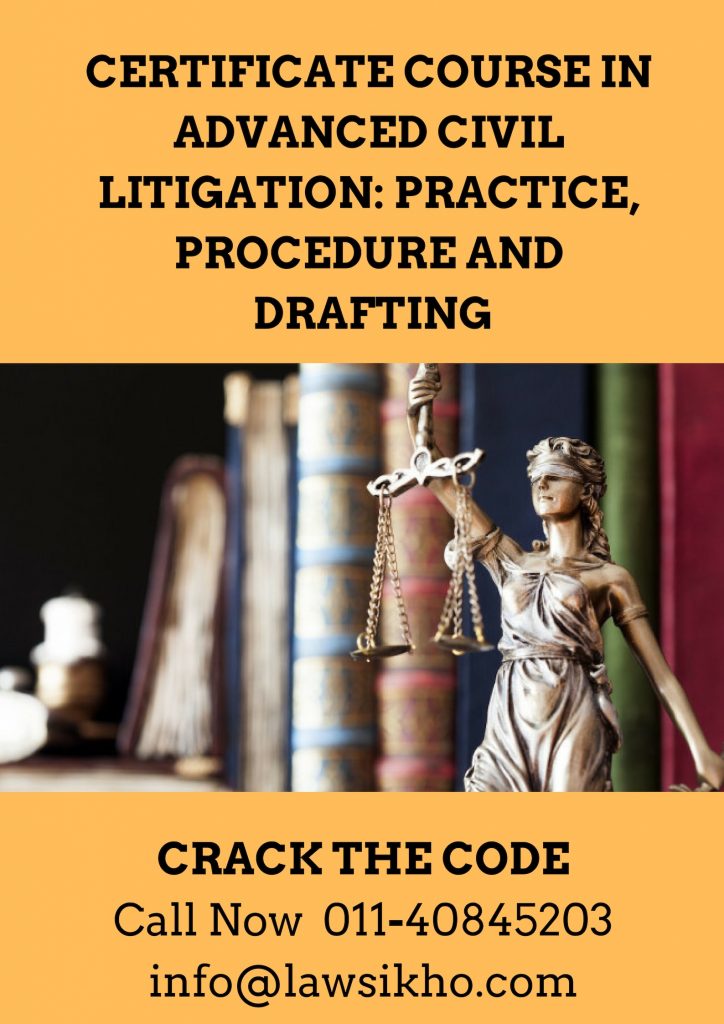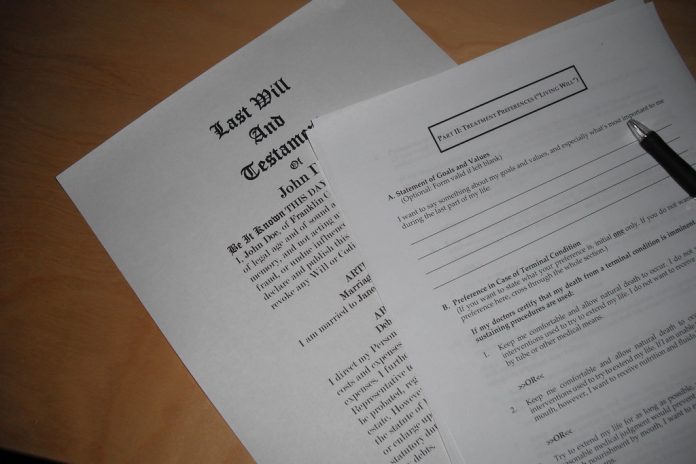This Article is written by Hyndhavi Hanumanthu pursuing Certificate Course in Advanced Civil Litigation: Practice, Procedure and Drafting offered by Lawsikho as part of her coursework. She has discussed the procedure for executing a Will under Indian Law.

Will has always occupied a prominent role in inheritance involved within a family. The procedure of making and executing a Will is explained in the Indian Succession Act, 1956. This Article unfolds the nuances involved with Will by answering a set of questions, which are given below:
- What is the significance of making a will/ why should a will be made?
- What are the different types of Wills?
- What is the law involved in making and execution of a will?
- What is the procedure to make a will?
- What is the Procedure to get a will executed?
- What role does a Lawyer play in the making and execution of a will?
Significance of Will in inheritance
Inheritance is originally passing the property of family or person to the younger generations either divided or as a whole. Inheritance paves way for the property belonging to a family generally stays in the family unless expressly given to outsiders. Inheritance is passed in two ways:
- Testamentary
- Intestate
A person making a Will falls under the Testamentary succession and by writing a Will, there is a choice of the will maker towards conveying the property to the recipients. The maker of a will is the testator. A will involves a maker and recipients and also an executor, whose basic duty is to execute the will of the testator as written by him word to word.
There are two kinds of property: inherited and self-acquired. In the existing times, self-acquisition of property is prevalent, owing much to the ambition and entrepreneurship thriving around. The significance of Will is that the property of a person is given to the persons he chooses and also to the extent he chooses. Thus forms a major advantage not only in family succession but also for self-acquired property owners.
Kinds of Wills
In general, there are two types of wills
- Privileged
- Unprivileged
Privileged wills
Sec 65 of the Act relates to the execution of privileged wills or oral wills. It is not applicable to Hindus. This type of will can be exclusively used by a soldier employed in an expedition or engaged in actual warfare, or an airman so employed and engaged or a mariner at a sea.
Unprivileged wills
This is dealt in sec 63 of the Act, which lays down 3 conditions for execution of a will such as:
- The testator shall by himself or through his representative sign or affix his mark to the will. In case of a representative, the sign or mark should be made in the testator’s presence and on his direction.
- The signature of the testator or his representative should be so placed that it should reveal clearly the intention of the testator to give effect to the Will.
- The signature of the testator or his representative should be Will should be attested by witnesses, two or more in number, each of them should have seen the testator or his representative sign or affix mark on the will in the appropriate place or should have received an acknowledgement from the testator personally to that effect.
It should be noted that there is no particular form of attestation and also no need for a witness to be present at the attestation of another witness.
Law involved in making and execution of a Will
The Indian Succession Act,1925 (hereinafter, the ‘Act’) deals in entirety about Wills. Section 2(h) defines Will as” the legal declaration of the intention of a testator with respect to his property which he desires to be carried into effect after his death.”
A will is made with the testator wanting to bequeath his property to the persons he choose to but only after his death for the purpose of ownership or enjoyment of lifetime or a limited time period. For the said purpose of executing his will with the intent of which it is written, an executor is appointed by the Will and named in the Will to that effect. The execution of Will starts only after the death of the testator.
A will should be written by a person who is in his sane mind as mentioned in section 74 of the Act. It can be handwritten by the testator or through his agent but should be witnessed by at least two people who are third parties to the Will.
Section 74 of the Act says about the wording of a Will as,” it is not necessary that any technical words or terms of art be used in a will, but only that the wording be such that the intentions of the testator can be known therefrom.

The procedure to make a Will
Any will is made generally by two modes:
- Through the testator himself
- Through a lawyer under the instructions of a testator.
There is no particular format involved in the writing of a Will though the legal community follows some templates. Whatever may be the model or format, there are mandatory steps to be followed while writing the document named Will. These are given below:
Step 1
It should specify that the document is “the last Will and testament executed by the testator” along with the full details of the testator.
Step 2
It should specify the list of the properties owned by the testator, which are to be fully described later down in the schedule annexed to the Will. These properties should include the properties which may not be known to the testator while wording the Will.
Step 3
The name of the executor along with the complete details like age and residence are to mentioned clearly and also mention executors’ relationship to the testator if any.
Step 4
The details of the family or persons to whom the property is being bequeathed in the Will.
Step 5
It is necessary to specify the statement that “with free will and volition and sound state of mind”, the property is being bequeathed.
Step 6
The properties are to be bequeathed to each person according to the will of the testator correlating clearly with the item numbers mentioned against the property in the schedule annexed.
Step 7
It should be specified that the Will shall come into force after the death of the testator and as revocable at any time as per the testator’s wish.
It is optional that there shall mention about bequeathing the properties that are not known to the testator at the time of wording the Will.
Step 8
A schedule describing in detail all the properties of the testator is to be specified. A schedule should typically contain the total extent, survey numbers, boundaries, the type of land and its situate along with its document number. It is to be noted that a schedule contains immovable and movable property both tangible and intangible such as shares owned.
Step 9
Signature of the testator along with date and place of execution of the Will is to be specified.
Step 10
The witness signatures or marks against their photograph in the final space of the Will attesting that the document was signed in their presence by the testator.
Procedure to get a Will executed
Any will is executed after the document is signed by the testator in presence of the witnesses, ideally two but the will is to be registered through registrar after paying required stamp duty to register the document.
A registered will is always more in approval than an unregistered Will though the latter is perfectly valid; the former is more effective in a contest before a Court of law.
The execution of a Will is to be done by the executor appointed for the purpose by the testator. It is nothing but the distribution of property of the deceased according his/her intent as worded in the Will. In order to start his duties as an executor of a Will, a probate is necessary. For this to be realized, the executor should apply for probate of the Will before a competent Court.
Probate
The concept of probate appears in the process of execution of Will. This is nothing but getting certified by the Court of Law as to the genuineness of a Will declaring the executor and the document itself as approved by law. It is given clearly in Section 57 of the Act that the wills and codicils made by any Hindu, Buddhist, Sikh or Jaina on or after 01.09.1870 within the territories of Bengal, Bombay and Madras and also with regard to the immovable property outside these territories, a probate should be applied for before the appropriate court.
According to Section 57 read with Section 213(2) of the Act, any Will and Codicil made by any Hindu, Buddhist, Sikh or Jaina on or after the 01.01.1927 need no compulsory approval from the Court in order for execution unless it is contested in a Court of Law. It is pertinent to note that the testamentary succession in the Act does not apply to the Muhammadans or Indian Christians.
Procedure to apply for a probate petition
- The petition should be filed with the complete details of the property mentioned in the Will along with party details.
- The will should be annexed along with the petition for the perusal of the Court.
- A schedule of properties in the Will should be mentioned in the petition.
- The appropriate Court shall the District Court where the property is situated or any High Court with ordinary original jurisdiction.
- It should be prayed that the petitioner should be declared by the court having rights as an executor to distribute the property in accordance with the intent of the Will-maker.
Lawyers’ role in the making and execution of a will
A lawyer’s role starts:
- If he is approached by a person to write a Will on his behalf but according to his will and intent
- If he is approached to investigate the authenticity of a Will and look for any visible legal lacunae
- If he has to file a probate petition on behalf of his client in order or to contest against a Will.
- It is considered to be on the safer side if a Will is drafted by a lawyer according to the will and intent of his client especially when a huge amount of property is involved.
Conclusion
A clear understanding is given with respect to writing a Will and how to execute the same with minimum ambiguity according to the procedure explained in the Indian Succession Act,1925.
References:
The Indian Succession Act,1925, Act No.39 of 1925;
M L Bhargava, Commentary on The Indian Succession Act,1925 (Kamal Publishers,2016)
Students of Lawsikho courses regularly produce writing assignments and work on practical exercises as a part of their coursework and develop themselves in real-life practical skills.
 Serato DJ Crack 2025Serato DJ PRO Crack
Serato DJ Crack 2025Serato DJ PRO Crack









 Allow notifications
Allow notifications



para 2 of step 7, and 2nd sentence of step 2 may be ambiguous in the procedure [?]